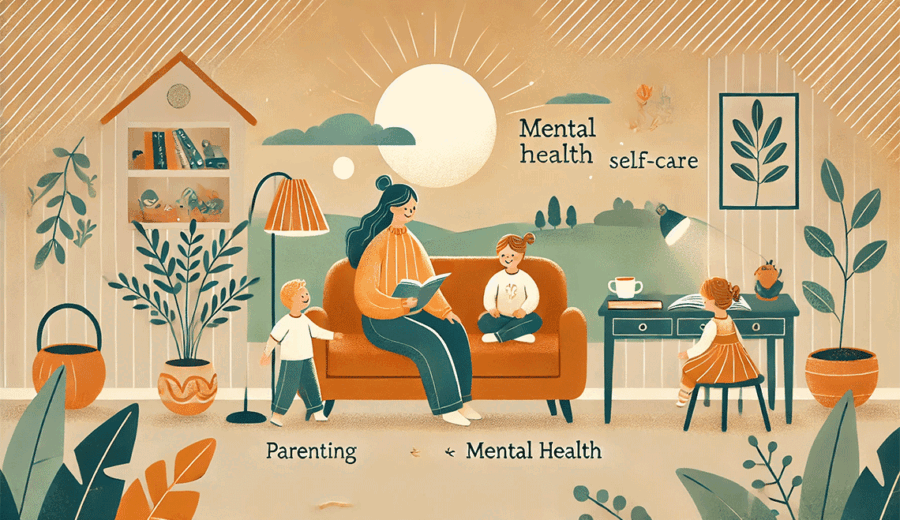
Parenting and Mental Health
Parenting and Mental Health: Finding Balance
Parenting is one of the most rewarding yet challenging journeys, filled with love, joy, and growth. However, it can also take a toll on mental health due to the physical, emotional, and mental demands of raising children. Finding balance is essential not only for the well-being of parents but also for fostering a healthy and supportive family environment.
Common Mental Health Challenges Faced by Parents
- Chronic Stress and Burnout:
- Balancing work, household responsibilities, and parenting can lead to overwhelming stress.
- Lack of rest and constant multitasking often result in burnout.
- Feelings of Guilt and Self-Doubt:
- Parents may feel guilty for not spending enough time with their children or for taking time for themselves.
- Comparisons with other parents can lead to self-doubt and feelings of inadequacy.
- Social Isolation:
- Parenting responsibilities can limit social interactions, leading to loneliness.
- A lack of support networks can make challenges feel more daunting.
- Mental and Physical Exhaustion:
- Irregular sleep patterns, especially for parents of young children, contribute to exhaustion.
- Emotional fatigue from constant caregiving can affect overall health.
- Postpartum Depression and Anxiety:
- Many new parents experience hormonal and emotional changes that can lead to postpartum mood disorders.
Tips for Maintaining Mental Well-Being While Parenting
1. Prioritize Self-Care
- Daily Routines: Dedicate even 10-15 minutes each day for activities that rejuvenate you, such as reading, meditating, or enjoying a hobby.
- Physical Health: Incorporate regular exercise and maintain a balanced diet to boost energy and mood.
- Adequate Rest: Aim for quality sleep by creating a bedtime routine and seeking support for night-time childcare if needed.
2. Seek and Accept Support
- Partner Teamwork: Share responsibilities with your partner or co-parent to reduce the load.
- Community Connections: Join local parenting groups or online forums to share experiences and gain advice.
- Professional Help: If stress feels unmanageable, seek counseling or therapy to develop coping strategies.
3. Manage Expectations
- Be Realistic: Let go of the idea of being a “perfect” parent. Aim to be present and loving instead of flawless.
- Delegate Tasks: Share household chores or hire help if possible, freeing up time for yourself and your family.
- Celebrate Small Wins: Acknowledge and appreciate your efforts and achievements, no matter how small.
4. Practice Mindfulness
- Mindful Parenting: Stay present during interactions with your children. Focus on the joy in everyday moments.
- Relaxation Techniques: Use deep breathing, yoga, or meditation to calm your mind during stressful situations.
- Gratitude Journaling: Write down three things you’re grateful for daily to shift focus to positive aspects.
5. Foster Healthy Relationships
- Open Communication: Share your feelings with your partner, family, or friends to reduce emotional burden.
- Date Nights: Spend quality time with your partner to maintain a strong relationship.
- Friendship Time: Reconnect with friends to avoid isolation and maintain a social life.
6. Involve Your Children
- Shared Activities: Engage in fun activities like crafts, baking, or gardening with your children.
- Teach Independence: Encourage children to take on age-appropriate tasks, which can lighten your load and build their confidence.
- Express Emotions Together: Teach kids about emotions and coping skills, fostering mutual understanding and growth.
7. Seek Professional Guidance for Parenting
- Parenting Workshops: Attend workshops to gain new perspectives and tools for effective parenting.
- Child Therapy: If your child has specific challenges, consider seeking help to understand and address their needs.
The Importance of Balance
When parents prioritize their mental health, the entire family benefits. Children learn resilience, empathy, and self-care by observing their parents manage stress and maintain balance. Building a supportive environment, both at home and within the community, is key to thriving as a parent.
Final Thoughts
Parenting is a journey that requires nurturing not only your children but also yourself. By adopting self-care practices, seeking help, and fostering meaningful relationships, you can achieve a balanced approach to parenting and mental well-being.





Leave a Reply